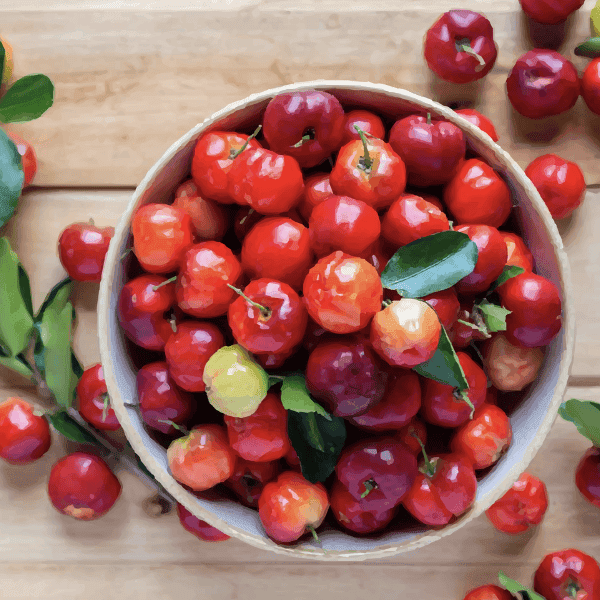
Acerola Powder {Organic}
Acerola, also known as Barbados cherry or West Indian cherry, is a bright red fruit that grows on the small acerola shrub, which is native to tropical regions of the Americas. It is celebrated for its exceptionally high vitamin C content, making it a potent natural source of this essential nutrient. Acerola is prized for its antioxidant properties, which support immune health and help combat oxidative stress. The fruit is often used in juices, jams, and supplements due to its tangy flavor and nutritional benefits. Acerola has gained attention globally as a healthful addition to diets, particularly for those seeking to boost their immune system and overall vitality.
You might need acerola cherries if . . .
Have you ever felt run down, stressed out? Maybe you’re struggling to bounce back from colds or illness. Or do you feel like you bruise more easily, or cuts take longer to heal? You might be low in vitamin C!
Acerola Cherries is a fruit that has the 2nd highest amount of vitamin C. It’s a tropical bush with fruit that looks like small berries. It’s found in the southern US, and in Central and South America.
Acerola cherries are great for those who might be:
- Low in iron
- Bruise easily
- Have slow wound healing
- Tired/sluggish
Benefits of Acerola Cherries
Acerola cherries are rich in vitamins and minerals than can support the body in many ways including:
- High in vitamin C and other antioxidants
- Great source of polyphenols
- Can support heart health
Common Ways to Use Acerola Cherries
- Juices
- Powder
- Baking
Growing and Foraging Information
Acerola cherries are a tropical plant, so it’ll be tough for many to grow or forage in the US unless you live in a tropical area. If you’re growing it in other locations, you will have to bring it in during the colder months. Acerola cherry bushes thrive in full sun and well-draining soil with a pH of 5.5 to 7.0. Prepare the soil by incorporating organic matter such as compost or aged manure to improve fertility and drainage. Keep the soil consistently moist but not waterlogged, especially during the plant's first growing season, and fertilize with a balanced fertilizer formulated for fruit-bearing plants. In regions with colder climates, consider growing acerola cherry bushes in containers that can be brought indoors during the winter months to protect them from frost damage. Use well-draining potting soil and provide adequate sunlight for healthy growth when grown indoors.
Safety Concerns
There are no safety concerns other than allergy to acerola cherry itself.
Drug Interaction: Acerola cherries are a food, if there are concerns with drug interactions, talk with your healthcare provider.
Breastfeeding and Pregnancy: There are no known contraindications for breastfeeding and pregnancy.
Other Concerns: None.
Select Studies About Acerola Cherries:
Acerola, an untapped functional superfruit: a review on latest frontiers - PubMed (nih.gov)
The study discusses Acerola (Malpighia emarginata DC.) as a rich natural source of vitamin C as well as various phytonutrients, including carotenoids, phenolics, anthocyanins, and flavonoids. With a significantly higher ascorbic acid content compared to oranges or lemons, Acerola has gained interest from the scientific and pharmaceutical communities due to its antioxidant capacity and properties such as skin whitening, anti-aging, and multidrug-resistant reversal activity.
This study discusses how vitamin C (also known as ascorbic acid) from Acerola cherries was used in the human body. Researchers compared the uptake of ascorbic acid in human intestinal cells (Caco-2 cells) between ascorbic alone and ascorbic acid in acerola juice at the same concentration, and found that the ascorbic acid in acerola cherry juice is utilized more in the plasma of healthy subjects.